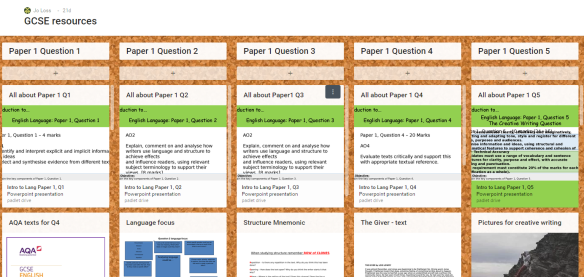Our summer term meeting was held on Monday 19th June at ACER and attracted 25+ participants. It began with a members’ exchange that prompted members to share examples of –
- any new resources they had piloted and found useful
- teaching approaches that seemed to have been effective
- exam revision strategies learners had found valuable
- learners who had made surprising progress
- online resources that had saved you time
- any new digital tools that they had explored
Bob recorded the main points from the discussion in the form of a mind map created on the GoConqr website –
 Many members who teach GCSE English said that they felt a tension between the need to engage their learners with relevant topics and accessible reading material whilst at the same time maintaining a consistent focus on the demands of the exam learners would face at the end of the year. Most felt that project work was more easily planned early in the autumn term when it was important to use topics that would help to motivate teenage learners after the difficulties and lack of success that they may well have experienced in the last two terms at school.
Many members who teach GCSE English said that they felt a tension between the need to engage their learners with relevant topics and accessible reading material whilst at the same time maintaining a consistent focus on the demands of the exam learners would face at the end of the year. Most felt that project work was more easily planned early in the autumn term when it was important to use topics that would help to motivate teenage learners after the difficulties and lack of success that they may well have experienced in the last two terms at school.
- Elaine Evans from East Coast College talked about the way she encourages learners to bring in interesting newspaper and magazine articles that they would use to make a scrapbook and then use for text analysis during the year.
- Amy Izod from Procat explained that they regularly ask learners to read quietly on their own for 10 minutes in each session.
- Richard Buckley from Central College Nottingham mentioned how he had created some Functional Skills projects using a range of digital tools (see afternoon session)
- Melanie Burr and Kerry Dolan from City College Norwich suggested that they will be planning some project activities for early in the autumn term to try to engage learners in GCSE study again using some motivating and easily accessed reading material
- Jo Loss said that since the last Network session they had been exploring the use of Plickers as classroom polling tool that learners could use without the need for a wifi enabled device
- Georgina Choat from Harlow College said she finds it useful to use video clips to explore narrative structure with GCSE learners
- Elicia Jonas and Alison Bartrip from Barking and Dagenham College reported that their learners needed regular use of simple writing frames throughout the year in order to become familiar with the different responses needed for GCSE questions
After the morning interval Jo Loss and Jacquie Hatch from Essex Adult Community Learning gave a presentation that reviewed the different resources and digital teaching approaches that they had used in preparing learners to tackle the demands of the GCSE fiction paper.
Like the session led by Jo at the event in March which looked at tackling non-fiction, this follow up workshop session was equally practical, informative and well received. Jo and Jackie talked about –
- their FastTrack course which starts in Jan and offers 5hrs support a week for 18 weeks in preparation for the June exam
- how they co-create with learners timelines of different sorts to help them become familiar with the key events in 19th ct social history as a background to exploring extracts from literature of that period
- the greater emphasis in the fiction paper on identifying implied meaning in a text, even in the first multiple choice comprehension question
- the difficulties learners have in recognising questions that ask you to compare the content of two texts rather than their stylistic features.
Jacquie asked members to work in groups to tackle a practical task which illustrated how she uses images to help learners develop their thinking and writing skills for the ‘synthesis’ question (see slides below)
Towards the end of their session Jo and Jaquie reviewed some of the key online sources of English teaching and learning material that they find useful. They recommended –
- the resources shared by a group of secondary English teachers on Twitter @teamenglish
- a Facebook page – GCSE English Language 9-1
- the use of structure strips as a writing frame format to ensure learners cover the mark criteria
Jo had kindly curated many of the most useful resources they had used this year on a Padlet board (see below). Whilst Jo had organised the resources on the Padlet board under headings showing each of the questions in the two AQA GCSE papers, the resources could be used for any of the new GCSE English specifications.

